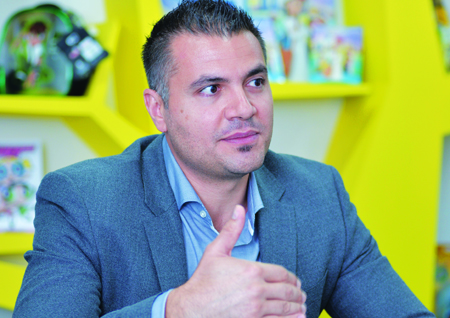Tarek Mounir, Vice President and General Manager at Turner Turkey, Middle East, North Africa, Greece & Cyprus, has been spearheading the network’s growth and expansion across the region since 2010. Mounir speaks exclusively to BroadcastPro ME about Turners journey so far and its plans for the region How did you come to be at Turner? […]

Tarek Mounir, Vice President and General Manager at Turner Turkey, Middle East, North Africa, Greece & Cyprus, has been spearheading the network’s growth and expansion across the region since 2010. Mounir speaks exclusively to BroadcastPro ME about Turners journey so far and its plans for the region
How did you come to be at Turner?
I have been in the media industry for quite some time now. I started off as a TV presenter, did talk shows and presented series and pageants for leading channels at the time. I started getting involved in the behind-the-scenes working of shows and gradually stepped into production and started producing shows and TV commercials. Then I moved into animation and joined Blink Studios in Dubai. We were, at that time, catering to the big companies and trying to work with international companies such as Turner, Viacom and Disney. I also had the opportunity to work on a joint production between twofour54 and the BBC, which was a milestone for the regional animation industry from a production perspective.
In 2010, when Turner first set up base in the Middle East, I was the first employee in its Dubai office. I gradually built the team here and expanded operations.
How has Turner developed in the years you have been here, and where do you see it heading in the future?
Turner was being played out of London on Orbit and Showtime until 2010, when they first set up a base in Dubai. Cartoon Network English, Boomerang and TCM were some of the pay channels that Turner provided in their original format in the Middle East. These were not localised.
We launched Cartoon Network Arabic with Ben10 on October 10, 2010. Im happy to say that since then Cartoon Network Arabic has become a household name. The idea was to localise the channel by offering dubbed programmes and also create local content. Our studios in Abu Dhabi are dedicated to production of local content.
Over the years, we have made sure that all of our English brands are subtitled or dubbed. In the region, we have been quite focused on Cartoon Network Arabic and have built the brand on many levels since its launch six years ago. We have a dedicated team to handle the licensing and merchandising for these brands, which I feel is very important.
The IMG theme park will further enhance the value of our brands, adding yet another experiential dimension to our offerings.
The free-to-air model that we are operating in the region is also thriving, and advertising has become a big part of our business. With the launch of general entertainment offering on beIN in 2015, we moved our encrypted feeds on beIN. These include CNN HD, HLN, Cartoon Network English and Hindi, Boomerang and TCM.
What is the secret to penetrating different markets and which of your markets offer strong growth?
The performance in international markets depend on when you enter those territories. Turner has a very strong presence in Latin America, which almost mirrors the networks US presence. Its offerings in those markets include sports and general entertainment, and of course kids and news.
In other markets, Turner is strongly associated with news and kids content, thanks to strong brands such as CNN and Cartoon Network. We were kind of late in the Middle East. We focused on the niche market, which was free-to-air for kids. The Middle East had primarily turned into an FTA market; even now, free-to-air is very strong in the region. It doesnt mean we have put aside our encrypted channels. We have seen the dynamics of the market change with telcos becoming very involved in pay TV and asking for premium channels.
The key to winning over audiences is no secret its your ability to deliver relevant and engaging content. Our dubbed content is not limited to dubbing the language but it also takes into account the cultural nuances of people. Its always adapted to regional requirements. We have a separate department handling adaptation where we have writers who understand English and Arabic very well. They rewrite the stories of our shows to make them relevant to the Arab market in order to make the content more relatable to the local audience.
Its an expensive layer, but we see it as an investment to make our channels more relatable. Our content speaks to the kids in the context that they can easily relate to.
We have a global partnership with Arqiva, who manages all of our commercial broadcasts from QC to playout. As for digital, we rely on Adtech for material broadcast and various reporting tools to monitor and measure campaign success.
What is your business model for the region? How do you choose the platforms for your channels?
We have one free-to-air channel, Cartoon Network Arabic, and have outsourced the ad sales for it to ATL, which is a part of the Zee Group.
Cartoon Network Arabic is the only kids channel in the ATL bouquet, and we dont need to build an ad sales team to handle just one channel. We did build an in-house licensing and merchandising team.
CNN remains our strongest brand and is a leading news channel in the region. The media business in general is changing quite drastically. Having said that, the linear channels still remain most highly consumed, but you see trends in OTT and on demand changing quickly.
As we grow our business in any market, Middle East included, we do think how the consumers are evolving, what type of devices are they watching the content on, and so on. Although our business model is more B2B than B2C, we do think of our consumers when working on deals with partners. We are one of the most invested international networks in the region.
Turners playout provider is Arqiva, and channel creation is managed by the London office. All of the channels are then fibred from London playout to Madrid Overon and uplinked to Es’hailSat. The network plans to uplink the channels to Eutelsat as well. The channels are redistributed via du and Etisalats IPTV distribution in the UAE.
Our playout will continue from London. There are many other reasons why we havent moved playout to Dubai.
Where is Turner headed from here?
News and kids will always be the main pillars of our content. Turner worldwide is getting into general entertainment more aggressively and investing in drama series and comedy. Turner will be announcing a new slate at the end of the year, and the content will be rolled out across the Middle East as well.
There is a rather large South Asian community here in the region, which is the reason we are considering introducing other regional languages as well, in addition to Hindi for Cartoon Network.
Turner is the biggest contributor to the Time Warner family. Between us, Warner Bros. and HBO, Turner has by far the largest contribution, being one of the largest suppliers of content across the board for pay TV platforms.
What is your strategy for growth in the MENAT region?
While the Middle East market has matured in some areas, other areas of the media industry remain untapped. I feel, despite our geographical expansion in the region, our products have not been fully monetised in the Middle East. Drama series, for instance, or, for that matter, comedy have huge potential.
Turner has recently taken a 10% stake in Hulu in America and also bought a stake in Refinery29, a web platform that caters to female audiences. We can explore bringing these to the Middle East in the future.
Turner has a very ambitious strategy with regard to eSports, a video gaming competition. The network is covering video game tournaments beginning this year. We are in discussions with various players to bring gaming into this region.
It goes without saying that digital is the future of broadcasting, and thats the direction Turner will be moving forward in.
What are the similarities and differences of the territories you oversee?
Our commercial business differs greatly for each market. Sometimes there are no similarities. The way we programme our channels and produce our promotions is tailor-made for each territory. Turkey has a separate team that runs the production hub and content management and playout, while the rest of the region has playout from London.
Since we are operating out of the GCC, our biggest focus is the GCC. Having said that, other markets are important too. Levant and North Africa are challenging markets because of the political instability, but we have teams travelling to these regions to explore commercial opportunities.
Through Turners studios, we are able to create bespoke and unique ads for our partners which not only reflect the local culture but also create brand association between our top-rating characters and the advertisers brands.
Furthermore, Turners 360-degree ad sales approach allows us to create tailor-made campaigns across multiple touch points ranging from web, mobile, TV, sponsorships, branded content and even reaching point of sale.
We treat each partner campaign as its own brief and ensure that in an ad-saturated market, we deliver one-of-a-kind experiences for our audiences, even during ad breaks.
With more pay TV operators entering the fray, are the dynamics of the Middle East TV industry set to change?
The MENA region is still dominated by free-to-air. The pay TV platforms have been very aggressive in investment and marketing plans in the region. Piracy remains a big challenge for pay TV operators. The fundamental idea is to offer quality and affordability, and beIN has achieved that to a large extent by giving a good mix of content at a good price point.
Sports is a massive pillar for pay TV, while general entertainment keeps the subscriber numbers in. There was an over-saturation in the free-to-air space in the region and very few companies were profitable in that space.
The key is to have a healthy balance between pay TV and free-to-air. Bypassing the pay TV window makes the market lopsided; as a free-to-air supplier, you cant invest ahead of pay TV. The windowing has to be organic.
Suffice to say that the dynamics of the Middle East pay TV and free-to-air industry are changing and changing for the better. I believe TV is growing healthily in the region and will continue to grow.















































































